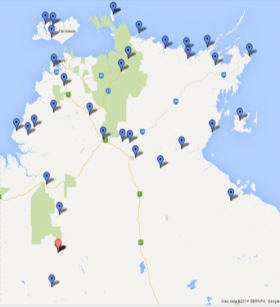Our Research
 RESEARCH AIMS
RESEARCH AIMS
The core objective of this prospective Life Course Program is to examine the effect of early life events and conditions on later health. Dr Susan Sayers initially aimed to study outcomes of fetal growth restriction (FGR) within the womb on subsequent growth and development of chronic diseases in adulthood. It is based on the principle that susceptibility to poorer health in adulthood is a dynamic process that begins in utero and occurs over the life course. By following people from birth across their life course we will help identify early those most at risk of developing chronic diseases such as diabetes, cardiovascular, renal and mental ill-health. This information will help develop strategies to contribute to closing the current gap in life expectancy between Indigenous and non–Indigenous Australians.
Where Do Participants Live?

Although born in Darwin the Life Course members now live in over 40 different urban and remote communites and outstations across the Top End, with some living interstate and overseas. We travel by air, sea and land to see each study participant face to face. We have been privileged to see some of the most beautiful country in Australia and have been warmly welcomed into many communities.
Aboriginal Birth Cohort
The Aboriginal Birth Cohort study travelled to see:
- 32 remote
- 6 outstations
- 8 urban centres
Where we travelled (2013 - 2015) and where we will go (2019 - 2021)»
Top End Cohort
Whilst the majority of people still live in Darwin, some have moved to other places in the NT, interstate and overseas.
Funding
The Life Course Program has been supported by grants from National Health and Medical Research Council, the Heart Foundation, the Colonial Foundation, Channel 7 Foundation SA, Darwin Honda, CVL Pfizer, and an NT Research and Innovation award.
